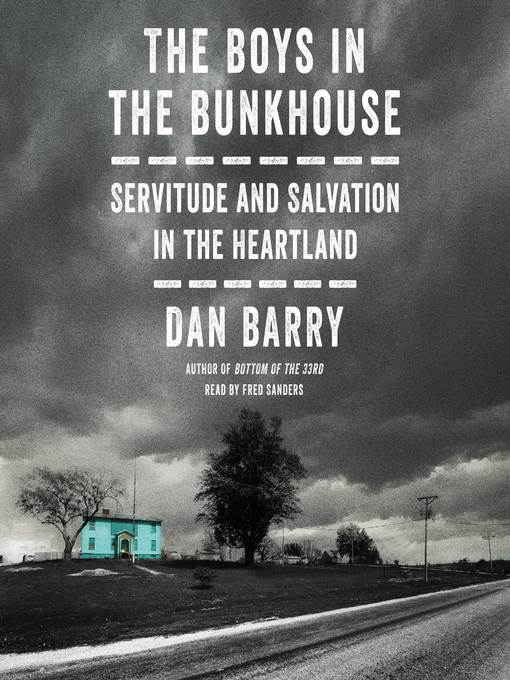
The Boys in the Bunkhouse
Servitude and Salvation in the Heartland
کتاب های مرتبط
- اطلاعات
- نقد و بررسی
- دیدگاه کاربران
نقد و بررسی

March 28, 2016
New York Times columnist Barry (Bottom of the 33rd) weaves a moving tale of how a group of 32 mentally disabled men from Texas were rescued in 2009 after decades of servitude. Through a state program, the men were first put to work in the 1960s at a turkey processing plant in Texas. Then, in 1974, they were moved to another plant in Atalissa, Iowa. There, they lived in an abandoned schoolhouse and eviscerated turkeys in return for room, board, and (low) wages. Over the years, the outside world changed, but theirs did not. They became more isolated from the local community, worked ceaselessly, and were neglected and abused. Only through the efforts of dedicated people, including Iowa state social worker Natalie Neel-McGlaughlin, Des Moines investigative journalist Clark Kauffman, and Texas labor lawyer Robert Canino, were the men eventually able to leave. Their stories, pieced together through extensive research and interviews, are both riveting and often difficult to read, though Barry tries to end on a positive note. Still, his descriptions of overdue reunions and the list recounting “where they are now” is a bleak testament to what happened to 32 men over decades of neglect.

April 15, 2016
Atalissa, Iowa, 2009. Acting on a tip, a social worker discovered dozens of older men with intellectual disabilities living in squalid conditions and exploited as cheap labor for 40-odd years. The men were tasked with eviscerating turkeys on a slaughterhouse assembly line--filthy, grinding work that netted them a paltry $65 a month along with a string of humiliations by their bosses. Veteran New York Times reporter Barry, who first documented this story for the Times in 2014, describes grown adults being put on time-outs like children and handcuffed to their beds. The author also recounts equally problematic paternalism as the bosses of Henry's Turkey Service occasionally took their employees on outings to brothels or bars. Meanwhile, Atalissa's townsfolk and various state agencies remained largely oblivious. Many of the men were previously institutionalized at Austin State School in Texas. In the 1960s, the state discharged them to work on ranches, hoping they would become self-supporting taxpayers. Lack of regulation paved the way for exploitation, culminating in a landmark 2013 verdict in the U.S. District Court. VERDICT Barry never reduces the men to victimhood; their personalities and joys spring vividly from the pages. Overall, the author presents a troubling case study of commercial exploitation and a wake-up call on how America treats its most vulnerable citizens.--Michael Rodriguez, Hodges Univ. Lib., Naples, FL
Copyright 2016 Library Journal, LLC Used with permission.

April 1, 2016
A gripping indictment of society's treatment of "losers." In 1966, a pilot program at the Abilene State School in Texas moved six developmentally disabled men to a ranch run by T.H. Johnson, who agreed to teach the "boys," as he called them, basic agricultural skills. They would be paid a pittance and board at the ranch, saving the state money and providing Johnson with a source of very cheap labor. Award-winning New York Times writer and columnist Barry (Bottom of the 33rd: Hope and Redemption in Baseball's Longest Game, 2012, etc.) rivetingly chronicles the lives of these men and 26 more who worked for the irascible Johnson at his turkey processing plant in Texas and, later, in Atalissa, Iowa. From 1974 until 2009, Johnson's workers, living in filthy, decrepit housing, were paid far below minimum wage, from which room and board were deducted; were denied medical and dental care; and were violently abused by their overseers. Every day, they caught, killed, and gutted turkeys, work, Barry writes, that was "hard...and repetitive, a bloody, filthy, feathery mess." Along the way, a social worker discovered the "slave-labor camp" and reported the "human-rights horror" to the Iowa Department of Social Services only to be told that the company's operation--a "for-profit business model with a paternalistic overlay of limited freedoms and routine discipline"--seemed legitimate. The townspeople of Atalissa liked the "boys," who sometimes came to town, marched in parades, and bought candy with their small allowances, and the men were proud to be workers; they didn't openly complain. But one man's sister, desperate over her brother's plight, caught the attention of a tenacious investigative reporter, whose expose shocked the nation. Finally, social services sprang to action, and the men were extricated, cared for, and embraced by those who had long ignored them. Gently, empathetically, and indelibly, Barry conveys a tale of unthinkable brutality.
COPYRIGHT(2016) Kirkus Reviews, ALL RIGHTS RESERVED.

























دیدگاه کاربران